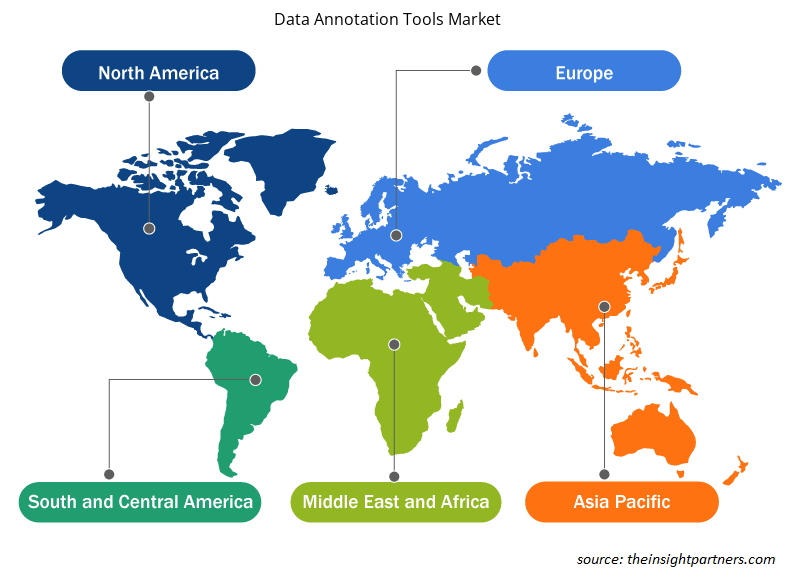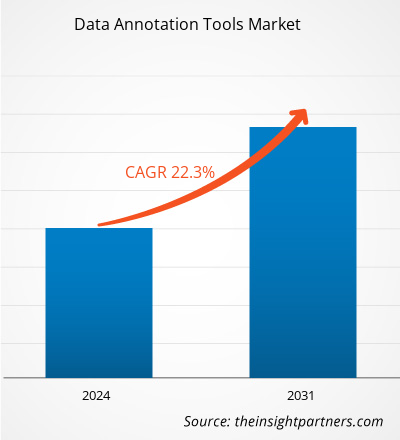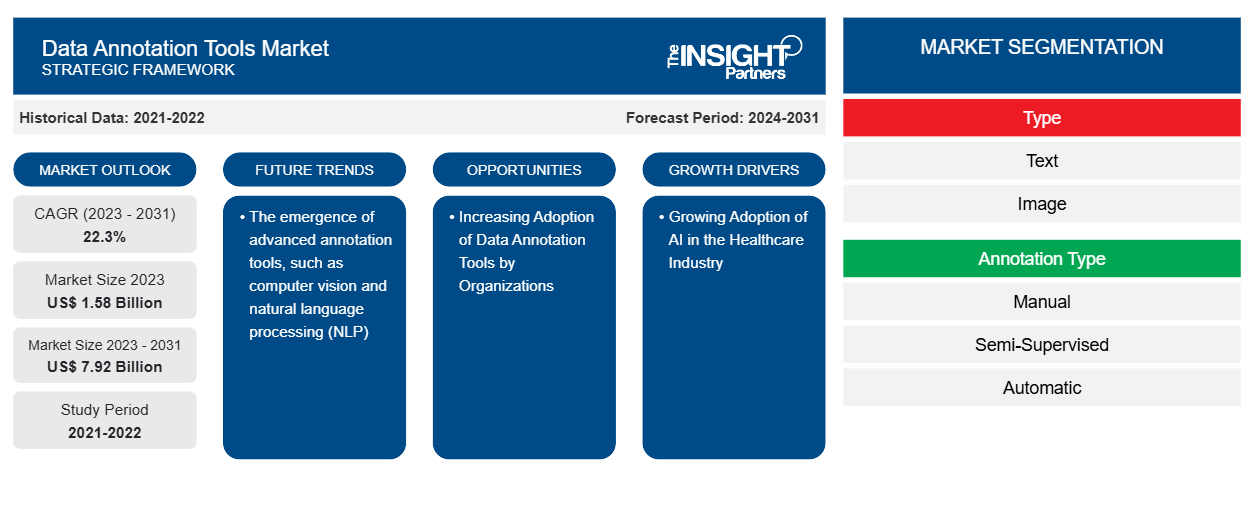Der Markt für Datenannotationstools soll von 1,58 Milliarden US-Dollar im Jahr 2023 auf 7,92 Milliarden US-Dollar im Jahr 2031 anwachsen. Der Markt soll zwischen 2023 und 2031 eine durchschnittliche jährliche Wachstumsrate (CAGR) von 22,3 % verzeichnen. Das Aufkommen fortschrittlicher Annotationstools wie Computer Vision und Natural Language Processing ( NLP ) dürfte weiterhin ein wichtiger Markttrend für Datenannotationstools bleiben.
Marktanalyse für Datenannotationstools
Der Markt für Datenannotationstools wächst rasant aufgrund der zunehmenden Verbreitung von KI im Gesundheitswesen und der zunehmenden Datenmengen, die durch fortschrittliche Technologien wie ML, IoT , fortschrittliche prädiktive Analysen, KI und Robotik generiert werden. Der Markt wächst stetig, angetrieben von der steigenden Nachfrage nach Self-Service-Anwendungen. Darüber hinaus bieten die zunehmende Verbreitung von Datenannotationstools durch Organisationen und die zunehmende Bereitstellung von Datenannotationstools der nächsten Generation durch Branchen lukrative Möglichkeiten für Marktwachstum.
Marktübersicht für Datenannotationstools
Datenannotationstools werden häufig mithilfe einer Mischung aus Datenwissenschaftstechniken und Softwareentwicklung erstellt. Der Prozess beginnt mit der Auswahl geeigneter Datenproben zur Annotation, die anschließend entweder von menschlichen Annotatoren oder automatisierten Algorithmen beschriftet oder annotiert werden. Annotationen können je nach Art der zu annotierenden Daten die Form von Begrenzungsrahmen, Schlüsselpunkten, Polygonen oder Textbeschriftungen haben. Datenannotationstools sind in Projekten zur künstlichen Intelligenz und zum maschinellen Lernen unverzichtbar, da sie Benutzer bei der Beschriftung und Annotation von Daten unterstützen und sie so für das Training von ML-Algorithmen geeignet machen. Diese Technologien sind für Anwendungen wie Objekterkennung, Textkategorisierung, Bildsegmentierung und Spracherkennung erforderlich. Die erheblichen Vorteile von Datenannotationstools wie Zoomen, Größenänderung und Schwenken erhöhen ihre Akzeptanz in Organisationen und treiben so den Markt an.
Passen Sie diesen Bericht Ihren Anforderungen an
Sie erhalten kostenlos individuelle Anpassungen an jedem Bericht, einschließlich Teilen dieses Berichts oder einer Analyse auf Länderebene, eines Excel-Datenpakets sowie tolle Angebote und Rabatte für Start-ups und Universitäten.
-
Holen Sie sich die wichtigsten Markttrends aus diesem Bericht.Dieses KOSTENLOSE Beispiel umfasst eine Datenanalyse von Markttrends bis hin zu Schätzungen und Prognosen.
Markttreiber und Chancen für Datenannotationstools
Die zunehmende Nutzung von KI im Gesundheitswesen treibt den Markt an
Die Datenannotation spielt eine wichtige Rolle bei der Verbesserung von KI-Anwendungen im Gesundheitswesen. In der medizinischen Bilddatentechnologie verwenden KI-gestützte Systeme Computervision oder maschinelles Sehen, um wahrscheinliche Verletzungen und Muster zu identifizieren, sodass medizinisches Personal nach der Untersuchung des Patienten automatisch Berichte schreiben kann. KI wird verwendet, um eine Datenbank mit Röntgenbildern, CT-Scans und MRT-Scans schnell zu untersuchen, um verschiedene Verletzungen zu diagnostizieren. Datenannotationstools helfen KI-basierten Systemen, die erfassten Daten aus durchschnittlichen und verletzten medizinischen Fotos zu trennen, um die Abschlussberichte der untersuchten Personen zu erstellen. Dies erhöht die Akzeptanz von Datenannotationstools zur Verbesserung von KI-Anwendungen im Gesundheitswesen.
Zunehmende Nutzung von Datenannotationstools durch Organisationen – eine Chance auf dem Markt für Datenannotationstools
Die Effektivität automatisierter Datenannotationstools und die zunehmende Nutzung von Cloud-Computing zur Annotation großer Datensätze schaffen Chancen auf dem Markt. Unternehmen verwenden Datenannotationstools, um die Genauigkeit zu verbessern und ihr Personal zu verwalten. KI-basierte Datenannotationstools verfügen über automatisierte Funktionen, was ihre Akzeptanz bei Unternehmen für das Personalmanagement erhöht. Datenannotationstools sind in wichtige Personalmanagementfunktionen integriert, darunter Aufgabenzuweisung und Produktivitätsanalysen , die die für jeden Job oder jede Unteraufgabe aufgewendete Zeit messen .
Datenannotationstools bieten Unternehmen eine umfassende Methode zur Verwaltung von Datensätzen und Arbeitsabläufen. Diese Tools unterstützen Unternehmen bei der Untersuchung, dem Import und der Handhabung der großen Datenmengen und Dateiformate, die sie kennzeichnen müssen, was im Prognosezeitraum voraussichtlich Chancen für den Markt schaffen wird.
Segmentierungsanalyse des Marktberichts zu Datenannotationstools
Wichtige Segmente, die zur Ableitung der Marktanalyse für Datenanmerkungstools beigetragen haben, sind Typ, Automatisierungstypen und Endbenutzer.
- Basierend auf dem Typ ist der Markt für Datenannotationstools in Text, Bild und Sonstiges unterteilt. Das Textsegment hatte im Jahr 2023 einen größeren Marktanteil.
- Basierend auf dem Anmerkungstyp ist der Markt in manuell, halbüberwacht und automatisch unterteilt. Das manuelle Segment hatte im Jahr 2023 einen größeren Marktanteil.
- In Bezug auf die Endnutzer wird der Markt für Datenannotationstools in die Bereiche Automobil, Regierung, Gesundheitswesen, Finanzdienstleistungen , Einzelhandel, IT und Telekommunikation und andere unterteilt. Das IT- und Telekommunikationssegment hatte im Jahr 2023 einen größeren Marktanteil.
Marktanteilsanalyse für Datenannotationstools nach geografischer Lage
Der geografische Umfang des Marktberichts zu Datenannotationstools ist hauptsächlich in fünf Regionen unterteilt: Nordamerika, Asien-Pazifik, Europa, Naher Osten und Afrika sowie Südamerika/Süd- und Mittelamerika.
In Bezug auf den Umsatz hatte der nordamerikanische Markt den größten Marktanteil bei Datenannotationstools, was auf die wachsende Beliebtheit von Datenbeschriftungstools und die zunehmende Nutzung von KI- und maschinellen Lerntechnologien durch Unternehmen zurückzuführen ist. Viele Organisationen in Nordamerika nutzen Datenbeschriftungstechnologie, um sicherzustellen, dass qualitativ hochwertige Dateneingaben den Markt antreiben. Darüber hinaus beflügelt die Entwicklung von KI- und Deep-Learning-Technologien den Markt in der Region.
Regionale Einblicke in den Markt für Datenannotationstools
Die regionalen Trends und Faktoren, die den Markt für Datenannotationstools während des Prognosezeitraums beeinflussen, wurden von den Analysten von Insight Partners ausführlich erläutert. In diesem Abschnitt werden auch die Marktsegmente und die Geografie von Datenannotationstools in Nordamerika, Europa, im asiatisch-pazifischen Raum, im Nahen Osten und Afrika sowie in Süd- und Mittelamerika erörtert.

- Holen Sie sich die regionalen Daten für den Markt für Datenannotationstools
Umfang des Marktberichts zu Datenannotationstools
| Berichtsattribut | Details |
|---|---|
| Marktgröße im Jahr 2023 | 1,58 Milliarden US-Dollar |
| Marktgröße bis 2031 | 7,92 Milliarden US-Dollar |
| Globale CAGR (2023 - 2031) | 22,3 % |
| Historische Daten | 2021-2022 |
| Prognosezeitraum | 2024–2031 |
| Abgedeckte Segmente |
Nach Typ
|
| Abgedeckte Regionen und Länder |
Nordamerika
|
| Marktführer und wichtige Unternehmensprofile |
|
Dichte der Marktteilnehmer für Datenannotationstools: Die Auswirkungen auf die Geschäftsdynamik verstehen
Der Markt für Datenannotationstools wächst rasant, angetrieben durch die steigende Nachfrage der Endnutzer aufgrund von Faktoren wie sich entwickelnden Verbraucherpräferenzen, technologischen Fortschritten und einem größeren Bewusstsein für die Vorteile des Produkts. Mit steigender Nachfrage erweitern Unternehmen ihr Angebot, entwickeln Innovationen, um die Bedürfnisse der Verbraucher zu erfüllen, und nutzen neue Trends, was das Marktwachstum weiter ankurbelt.
Die Marktteilnehmerdichte bezieht sich auf die Verteilung der Firmen oder Unternehmen, die in einem bestimmten Markt oder einer bestimmten Branche tätig sind. Sie gibt an, wie viele Wettbewerber (Marktteilnehmer) in einem bestimmten Marktraum im Verhältnis zu seiner Größe oder seinem gesamten Marktwert präsent sind.
Die wichtigsten auf dem Markt für Datenannotationstools tätigen Unternehmen sind:
- Appen Limited
- CloudFactory Limited
- Cogito
- Keylabs.ai LTD
- Google LLC
- Labelbox, Inc
Haftungsausschluss : Die oben aufgeführten Unternehmen sind nicht in einer bestimmten Reihenfolge aufgeführt.

- Überblick über die wichtigsten Akteure auf dem Markt für Datenannotationstools
Marktnachrichten und aktuelle Entwicklungen zu Datenannotationstools
Der Markt für Datenannotationstools wird durch die Erfassung qualitativer und quantitativer Daten nach Primär- und Sekundärforschung bewertet, die wichtige Unternehmensveröffentlichungen, Verbandsdaten und Datenbanken umfasst. Im Folgenden finden Sie eine Liste der Entwicklungen auf dem Markt für Datenannotationstools und -strategien:
- Im November 2023 wählte Appen Limited, ein führender Anbieter hochwertiger Daten für den KI-Lebenszyklus, Amazon Web Services (AWS) als primäre Cloud für seine KI-Lösungen und Innovationen. Die Unternehmen erweitern ihre Beziehung mit einer mehrjährigen Vereinbarung, während Appen neue Unternehmenslösungen für die Beschaffung, Annotation und Modellbewertung von KI-Daten entwickelt. (Quelle: Appen Limited, Pressemitteilung, 2023)
Marktbericht zu Datenannotationstools: Abdeckung und Ergebnisse
Der Bericht „Marktgröße und Prognose für Datenannotationstools (2021–2031)“ bietet eine detaillierte Analyse des Marktes, die die folgenden Bereiche abdeckt:
- Marktgröße und Prognose auf globaler, regionaler und Länderebene für alle wichtigen Marktsegmente, die im Rahmen des Projekts abgedeckt sind
- Marktdynamik wie Treiber, Beschränkungen und wichtige Chancen
- Wichtige Zukunftstrends
- Detaillierte PEST/Porters Five Forces- und SWOT-Analyse
- Globale und regionale Marktanalyse mit wichtigen Markttrends, wichtigen Akteuren, Vorschriften und aktuellen Marktentwicklungen
- Branchenlandschaft und Wettbewerbsanalyse, einschließlich Marktkonzentration, Heatmap-Analyse, prominenten Akteuren und aktuellen Entwicklungen
- Detaillierte Firmenprofile
- Historische Analyse (2 Jahre), Basisjahr, Prognose (7 Jahre) mit CAGR
- PEST- und SWOT-Analyse
- Marktgröße Wert/Volumen – Global, Regional, Land
- Branchen- und Wettbewerbslandschaft
- Excel-Datensatz
Aktuelle Berichte
Verwandte Berichte
Erfahrungsberichte
Grund zum Kauf
- Fundierte Entscheidungsfindung
- Marktdynamik verstehen
- Wettbewerbsanalyse
- Kundeneinblicke
- Marktprognosen
- Risikominimierung
- Strategische Planung
- Investitionsbegründung
- Identifizierung neuer Märkte
- Verbesserung von Marketingstrategien
- Steigerung der Betriebseffizienz
- Anpassung an regulatorische Trends























 Kostenlose Probe anfordern für - Markt für Datenannotationstools
Kostenlose Probe anfordern für - Markt für Datenannotationstools